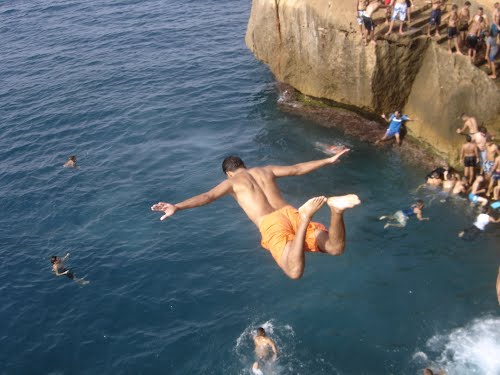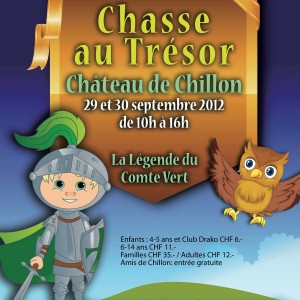Diving into the online lake
Before I begin my blog, I wanted to say thank you Jim for the video that has made you think. The comments were very useful and they made me think as well. I agree with Tom that my own blog entries should be posted earlier and that I should contribute more to discussions. I have therefore decided to finish my blogs by Thursday mornings and dedicate Thursday and Friday to adding and respond to comments.
 When I was 10 years old, my brother dared me to jump off a 10 meter diving board into Lake Geneva, in Switzerland. Since my brother was older and cooler than me, I had to impress him, so I climbed the ladder, went to the edge of the board, closed my eyes, and just jumped. In midair, I opened my eyes, looked down, and saw rocks below me. I screamed and tried to climb back up, as though there was a cord hanging from the board. I ended up falling into the water, and I did not get hurt, but I decided not to make the same mistake again.
When I was 10 years old, my brother dared me to jump off a 10 meter diving board into Lake Geneva, in Switzerland. Since my brother was older and cooler than me, I had to impress him, so I climbed the ladder, went to the edge of the board, closed my eyes, and just jumped. In midair, I opened my eyes, looked down, and saw rocks below me. I screamed and tried to climb back up, as though there was a cord hanging from the board. I ended up falling into the water, and I did not get hurt, but I decided not to make the same mistake again.
This year, having volunteered to teach a French 101 course online is starting to feel a lot like when I jumped off the diving board in Geneva, Switzerland. At first, it seemed easy enough, but it is now starting to seem more and more difficult. The biggest difference is the fact that almost everything needs to be planned and designed before the semester begins. I am beginning to understand how important it is to start organizing the course, the syllabus, the objectives, assessments, etc. very early and to seek help from whoever is willing to help.
I am now reading the Teaching Online book from a different perspective. I pay more attention to what I should watch out for, or what they suggest I should not do. As teachers, we are all quite aware of what it takes to define course objectives, design activities or assessments, or to assess student progress. But how do we do all of this online? Or, better yet, how do we NOT do all of this online?
Here are a few things I have learned from my first week of course design:
1) Videos, Screen-casting, or Powerpoint presentations with audio, are not a very good idea. I like to show rather than tell, or to speak rather than write. This doesn’t work very well online. It is better to have just audio by itself, just PowerPoints, or just text by itself. Videos will appear in one browser but not in another browser, and it is extremely difficult to situate them exactly where you want.
2) In the “Implementing the seven principles: Technology as lever” site, I took away the fact that prompt feedback is essential in an online course. It is not a good idea to provide time-delayed responses to students’ contributions because these responses are the only way that students can get to know the instructor.
3) In my French 101, I will cover 1 chapter section per week. I will therefore have weekly folders for each chapter section. I will be following Pilar Hernandez and Janeen Apalatea’s presentations.
4) If you are using Blackboard to design your course, I recommend going through the Blackboard tutorials. You will learn a lot about designing a course in Blackboard.
5) Creating an online quiz is a very fun but tedious task.
Finally, I struggled a lot with the online aspect of online teaching. I have finally rationalized and resolved this struggle by looking at technology as the cool thing kids do these days. Students love texting, chatting, being on social networks. Let’s take advantage of this and make them use their skills and virtual selves to learn something online. We will learn a lot from our students who wake up and go to sleep with the online world.










Recent Comments